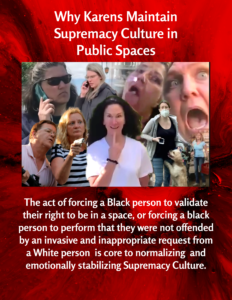The tweets by Claudia Alick shed light on the pervasive nature of Supremacy Culture and its impact on Black people’s agency, personal narratives, and labor. According to Alick, Supremacy Culture grants white people the expectation that they should have uninterrupted access to the bodies and personal narratives of Black people in public spaces. This privilege often translates into unwelcome questioning, inappropriate labor orders, and emotional caretaking expectations from Black people.
Supremacy culture gives white people, the expectation that they should have uninterrupted access to our bodies, our personal narratives, and agency, in public spaces.
— claudiaalick (@claudiaalick) March 10, 2023
The act of forcing Black people to validate their right to be in a space or perform that they were not offended by an invasive and inappropriate request from a white person is core to normalizing and emotionally stabilizing Supremacy Culture. Alick argues that the expectation of access to Black labor is where many “Karen performances” are based. This expectation also fuels the “Where are you from?” and “Can I touch your hair?” performances that Black people are subjected to in public spaces.
Supremacy Culture requires constant maintenance, and it is an obviously unnatural and uncomfortable way to run a society. However, if you belong to the most privileged class, there’s an underlying discomfort and guilt in that position. These performances emotionally assuage that guilt and discomfort, making it easier for white people to maintain their privilege without having to confront the systemic inequalities that enable it.
Supremacy Culture creates a power dynamic where white people feel entitled to access Black people’s bodies, narratives, and labor. This entitlement is deeply rooted in the history of white supremacy and colonialism, where Black people were viewed as property to be used for white people’s benefit. Even though slavery and colonization have been abolished, the remnants of these systems still linger in the form of Supremacy Culture.
To dismantle Supremacy Culture, we must first acknowledge its existence and the harm it causes. We must also confront our own complicity in maintaining this system, whether through our actions or inaction. We must listen to the voices of those who are most impacted by Supremacy Culture and work towards creating a more just and equitable society where everyone’s agency, personal narratives, and labor are respected and valued.

